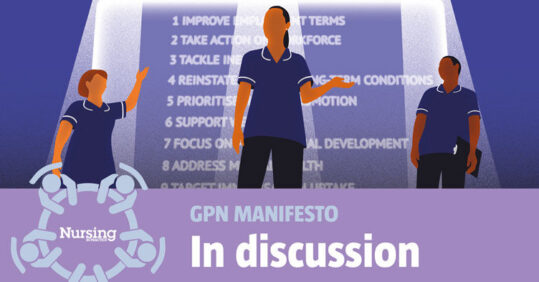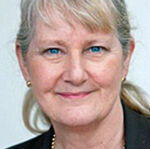Megan Ford reports on a Nursing in Practice roundtable event, discussing challenges around employment terms and workforce for general practice nurses (GPNs), drawn from the GPN Manifesto 2024.
This site is intended for health professionals only

Megan Ford reports on a Nursing in Practice roundtable event, discussing challenges around employment terms and workforce for general practice nurses (GPNs), drawn from the GPN Manifesto 2024.
The manifesto for general practice nursing was launched by Nursing in Practice this year, to highlight key areas in which general practice nurses (GPNs) want to see improvements.
Nursing in Practice met with a group of nurses behind our 10-point manifesto for general practice nursing as part of an exclusive roundtable discussion series.
For our first event, we discussed ongoing challenges around pay, terms and conditions and the barriers to recruitment and retention within the sector. Here we dive into those concerns and explore potential opportunities for the profession.
Why was this an important debate to have?
The GPN Manifesto calls for action on pay, conditions and recruitment and retention to help resolve widespread job vacancies in general practice and the number of GPNs who are approaching retirement or choosing to look for roles elsewhere.
Central to the conversation among the five nurses involved was that GPNs are the ‘cornerstone’ of the sector and that without them large proportions of primary care would likely ‘collapse’.
In the following discussion, nurses emphasise that it is so vital that general practice is visible, attractive and accessible to those seeking a nursing career and that efforts are made to recognise, value and ultimately retain those in post.
In some areas it appears more must be done to show nursing students that general practice is a viable, exciting and skill-driven career, from the outset of their registration.
Perhaps of greater concern is the funding barriers preventing students from being able to learn in a general practice setting in the first place.
Students ‘funnelled’ into secondary care
How can more nurses be encouraged to work in general practice?
Sara Baldwin, nurse manager in a GP practice in the northwest of England, argued ‘the biggest issue’ for pre-registration nurses ‘is they are not told that they can come into general practice’.
Ms Baldwin spends time speaking with nursing students at local universities and said from her experience many do not know that general practice is an option.
‘Everybody thought it was a retirement prospect and they didn’t get the fact that actually you’re going to upskill massively when you come into general practice,’ she said.
Many nursing students are almost ‘funnelled’ into secondary care, added Ms Baldwin, who is also an advanced clinical practice lead at a training hub and a Queen’s Nurse.
Another part of the problem was that the funding to house nursing students on a clinical placement in GP surgeries was ‘so poor’, said Ms Baldwin.
‘That impacts on the number of placement areas we can actually access. I’ve done loads of work with the GPs in our areas, trying to engage with practices to try and push things forward.
But it is incredibly difficult when the tariff is so small, because they can’t justify the cost of taking those nurses,’ she added.
Demand for placements outstrips supply
Meanwhile, Joanna Vintis, nurse lead and head of workforce development for Newcastle GP services, said in her area demand for a nursing placement in general practice had been ‘so huge’ that it outstripped supply.
‘I have a waiting list of 100 third-year students who want a placement in general practice that we cannot place because there aren’t enough training opportunities,’ she said.
Demand was so great in fact she had doubled her nursing student intake this year, noted Ms Vintis.
‘The students themselves are desperate to be out here and to work with us. But practices are still reluctant to give them the opportunities and it’s [about] getting practices to understand that we are running out of fully qualified experienced nurses,’ she said.
Large proportions of her GPN workforce were set to retire in the next five years. ‘It’s part of our jobs as the current nursing workforce to share our knowledge with the next generation. So, we have to have time to work alongside them,’ added Ms Vintis.
‘We need the practices to see that either newly qualified or somebody that’s transitioning from secondary care – that it’s worthwhile and that we need to invest in these people now.’
‘I’ve deterred from joining because of terms and conditions’
While investing in the future workforce is a top priority, GPNs also discussed the need to value, reward and retain the existing workforce too.
It was agreed by many that some form of standardised pay guidance, in line with competencies, was required to help stamp out discrepancies and inequities across the profession.
Some argued that being employed independently meant they had been able to negotiate their pay to their advantage, though it was also recognised that not all GPNs had the confidence to do this.
The GPNs also stressed employment terms, including sick and maternity pay, were not in line with that typically offered in secondary care.
Ms Vintis said she had advised nurses to avoid a career in general practice if they were looking to start a family soon because ‘maternity pay is nowhere near what the trusts offer’.
She added: ‘That is so sad for our profession – that, as somebody who is the biggest advocate for practice nursing, I’m telling someone not to do it.’
In terms of pay, Ms Vintis said she was probably one of the GPNs that ‘got paid more’ because she negotiated her own terms and conditions with her practice and suggested she could be ‘negatively affected’ if standardised pay was introduced.
‘I’ve forged my own career and the path that I wanted to take, that I wouldn’t necessarily have been able to do if I’d been in a structured pay scale. We have huge advantages of working independently,’ she added.
However, to make it ‘fair and equitable for our nursing peers as a whole’, she believed standardisation was required.
GPNs need standardised pay guidance
Jenny Aston, an advanced nurse practitioner working in a large primary care network outside Cambridge, argued GPN pay could be standardised against the Primary Care and General Practice Nursing Career and Core Capabilities Framework published in 2021.
The framework, which was supported by the Royal College of Nursing (RCN) and the Queen’s Nursing Institute, sets out the skills and knowledge needed through six levels of practice in general practice – from support worker and nursing associate level through to advanced and consultant level practice.
‘I think we need some standardised guidance related to the competencies,’ said Ms Aston, who is also a Queen’s Nurse.
‘Somebody should be writing a national guidance document based on the career framework competencies and basically saying “this is where [pay] ideally should be”.’
While GP practices could not be forced to comply with such guidance, it would ‘help nurses to negotiate what they are actually entitled to’, suggested Ms Aston.
Meanwhile, Ms Baldwin argued a step further and suggested GPN pay needed to be included within the GP contract.
‘There needs to be parity across the practices and the only way they’re going to instil that is to actually get it in the GP contract that there needs to be equality across the practices,’ she said.
‘We need to make sure that that this conversation is happening within the contract building. And there needs to be nurses at that contract level.’
Primary care at risk of ‘collapse’ without GPNs
According to a recent RCN survey, almost half of GPNs in England went without a pay rise last year, despite a 6% increase promised by the government last summer. And more than three-quarters (77%) did not receive the full 6%.
The RCN teamed up with the British Medical Association (BMA) last year to call for joint working on pay terms and conditions for GPNs, and in February the college said it was looking to ‘find allies’ across primary care as part of its ongoing fight to secure better pay for GPNs.
Ms Baldwin aired serious concerns about the prospect of nurses leaving the sector because of pay and conditions.
‘Everybody is haemorrhaging staff. We are desperately trying to get staff into place and keep staff in place,’ she warned.
‘We need to make sure that they really understand that if we go, there’s going to be this massive void,’ added Ms Baldwin.
‘And I would genuinely with hand on heart say that I would expect the large proportions of primary care to collapse if the nurses disappear.’
Pay must reflect developing role of GPNs
Rebecca Shearer, lead nurse at West Road Medical Centre and an advanced nurse practitioner, echoed the need for standardisation across GP practices and stressed this was ‘really important’.
‘I think we’re all a bit sick of being compared to nurses who work in hospitals – we are all a bit sick of hearing about that,’ she said.
‘We are all nurses, we all deserve the respect for what we do in our different roles, and I don’t see why there should be huge differences in standards.’
She added: ‘I think that [for] general practice nurses the pay needs to reflect the developing role that they are doing.’
Ms Shearer said the ‘opportunities in practice nursing at the minute are huge’ as the profession was ‘taking on so much’.
‘I manage all of the respiratory at my practice, I manage all of the diabetes. And I think pay has to reflect that the extra things that we do and the extra responsibility that we take on as well,’ she added.
Julie Roye, head of primary care nursing at East London NHS Foundation Trust, argued there were both positives and negatives of GPNs being employed independently.
For example, she discussed how when recruiting GPNs into the trust she was stuck within a pay ‘regime’ without much ‘wiggle room’ for negotiations.
She suggested there were cases where she had to inform GPNs coming to the trust that she could not pay them at the band they required because their skills did not always fit correctly.
‘Some nurses have been paid remuneration which has been much higher than the skill sets that they have, or the experience,’ said Ms Roye.
‘I may have a really fantastic nurse who does exactly what you said Rebecca – she may do all of the respiratory at the surgery – but there’s another skill that I’m looking at for me to make her a band 8A.
‘I can’t just say, “yes, I can see your skills, I can make you an 8A” – I cannot do that because I’m stuck within that regime.’
She added: ‘However, if I do have a nurse that’s come from general practice, and they’ve had several years in general practice, I can give them the annual leave. And it’s the same thing when it comes to the sickness, and all of those other benefits, because of the time that they’ve worked within that GP practice.’
Ms Roye said she took her ‘hat off’ to those GPNs who had been able to negotiate their pay within GP practices and said there were ‘benefits of being a standalone, and there’s also negatives of being standalone’.
Positives and negatives of general practice nursing
To conclude the discussion, Nursing in Practice asked each roundtable participant for one current positive and one negative of general practice nursing.
Julie Roye: ‘We need to look at ARRS in a different way’
 ‘I think that my positive is that this is a specialised area. It’s as specialised as ITU. I wouldn’t be able to use any of those machines in there, I’d be totally lost. This is primary care. It’s specialised, and we need to celebrate that in its fullness. That’s my positive,’ she said.
‘I think that my positive is that this is a specialised area. It’s as specialised as ITU. I wouldn’t be able to use any of those machines in there, I’d be totally lost. This is primary care. It’s specialised, and we need to celebrate that in its fullness. That’s my positive,’ she said.
For her negative, Ms Roye said she felt some of the roles on the additional roles reimbursement scheme (ARRS) had not been ‘appreciated’ enough.
While recognising the problems around some, she said there were also some that were ‘excellent’.
‘I think that people look at [the ARRS] in a way that it can come across as quite negative. I think that we need to look at it in a different way, just from my experience that I’ve seen.’
Joanna Vintis: ‘Practice nursing is fundamental to general practice’
 ‘So I think it’s one of the things that I sort of thought when we all logged in here – I am not an advanced practitioner. I am not a nurse practitioner, I am a practice nurse. I don’t hold a prescribing qualification; I do not want to hold that qualification. I am a practice nurse.
‘So I think it’s one of the things that I sort of thought when we all logged in here – I am not an advanced practitioner. I am not a nurse practitioner, I am a practice nurse. I don’t hold a prescribing qualification; I do not want to hold that qualification. I am a practice nurse.
‘And there is a huge gap that people do not see and register what we do as a profession. If you look at our progression routes, in general practice, it is “do this level, then do your prescribing” and there’s no other option considered.
‘I will stand on this hill forever, that practice nurses are fundamental to the care that goes on in primary care. Without practice nurses, we have nothing so, for me, that’s the biggest negative – that we are seen as slightly less than our ANP sisters and brothers.’
She added: ‘But that is also the positive that we are the cornerstone of primary care. And we have the most highly skilled and dedicated workforce. And I am honoured to be among them. And to be there waving a flag to shout about how great we are is an absolute pleasure.’
Rebecca Shearer: ‘It’s a really exciting place to be’
 ‘My positive is I think there’s a world of opportunities at the moment. I think it’s a really exciting in place to be,’ she said.
‘My positive is I think there’s a world of opportunities at the moment. I think it’s a really exciting in place to be,’ she said.
‘I struggle with negative I think it’s because I’m so happy in my job, and I think I’m valued in my job. But I think when I look at it across the workforce, I think we’re just missing standardisation of terms and conditions.’
Jenny Aston: ‘GPNs get to know the person’
 ‘I think the positive is that I think GPNs are the best of patient centred care, because they get to know the person. They understand that people have multiple things wrong with them, and they know their patients, when they’re allowed to have enough time to do it well,’ she said.
‘I think the positive is that I think GPNs are the best of patient centred care, because they get to know the person. They understand that people have multiple things wrong with them, and they know their patients, when they’re allowed to have enough time to do it well,’ she said.
‘My negative is that I worry that general practice nursing is a dying breed because of politics and because of opportunities to train in nursing – not doing tasks, not taking away some of the doctor’s work.
‘Because in my view, things like minor illness doesn’t exist. It’s dangerous, because you only know it’s minor once you’ve excluded everything else, and you can’t do that if you don’t have training and diagnostic skills.’
She added: ‘I think the way we can address the dying breed is to look at the pipeline, look at valuing nurses in every respect – so terms and conditions, and nurses being partners, being on boards, being in positions where their voice is heard.’
Sara Baldwin: ‘Our role is being eroded’
 ‘Positive – I think nurses are super connectors. I think we are the drivers of change in primary care. I do think we work to best practice, and we promote holistic care,’ she said.
‘Positive – I think nurses are super connectors. I think we are the drivers of change in primary care. I do think we work to best practice, and we promote holistic care,’ she said.
‘And to coin an old phrase, we do make every contact count. And we really push the patient agenda. And we’re really fabulous advocates of that. And I think that in itself is amazing.
‘Negatives – I think there is a workforce erosion. I do think the practice nurse role is trying to be stripped back.’
Ms Baldwin added: ‘We are absolutely fabulous. We are specialist generalists, just like a GP is, but in our own code, within our own competencies, just like they are.
‘And actually, I think we should be celebrating that. But it is very difficult to celebrate that when our role is being eroded as it is at the moment.’
Our thanks to the nurses who contributed to developing the GPN manifesto, and those taking part in the GPN manifesto roundtable events, Further roundtable discussions will follow on more of the manifesto points.
The government should ensure general practice nurses have the same pay, terms and conditions as their secondary care colleagues.
The NHS, practices, universities and other stakeholders need to change the narrative, to encourage more nurses to choose general practice.
Practices, PCNs, the NHS and government should do more to promote the health of our less well-off families.
#4 REINSTATE TIME FOR LONG-TERM CONDITIONS
Practices and PCNs need to free up time for GPNs to empower patients to manage their long-term conditions, including diabetes, asthma and COPD.
#5 PRIORITISE HEALTH PROMOTION
NHS England, PCNs, and GP practices should ensure GPNs have the time and resources to carry out their crucial role in public health promotion and disease prevention.
GPN employers, PCNs and nursing bodies need to support nurses with their health and care, so they can care for others.
#7 FOCUS ON PROFESSIONAL DEVELOPMENT
All nurses should be given the time for professional development to progress their careers. NHS England, PCNs and practices should encourage and support the GPN and ANP roles to grow in general practice.
It is important for general practice nurses to consider parity of esteem – valuing the patients’ mental health needs equally to their physical health.
GPNs need to play an important role in overturning the decline in childhood immunisation uptake.
General practice needs to continue to evolve to serve patients better, adopting approved digital platforms and applications to improve patient care and outcomes.
If you have your own comment on any of the manifesto points, we would love to hear from you. Please email the editor: [email protected].
